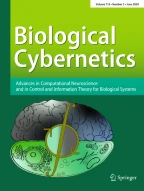Abstract
We describe a method for the characterization of electroencephalographic (EEG) signals based on a model which features nonlinear feedback. The characteristic EEG ‘fingerprints’ obtained through this approach display the time-course of nonlinear interactions, rather than aspects susceptible to standard spectral analysis. Fingerprints of seizure discharges in six patients (five with typical absence seizures, one with complex partial seizures) revealed significant nonlinear interactions. The timing and pattern of these interactions correlated closely with the seizure type. Nonlinear autoregressive (NLAR) analysis is compared with other nonlinear dynamical measures that have been applied to the EEG.
Similar content being viewed by others
References
Akaike H (1974) A new look at statistical model identification. IEEE Trans Auto Control AC-19:716–723
Babloyantz A, Destexhe A (1986) Low-dimensional chaos in an instance of epilepsy. Proc Natl Acad Sci USA 83:1313–1317
Casdagli M, Des Jardins D, Eubank S, Farmer JD, Gibson J, Hunter N, Theiler J (1991) Nonlinear modeling of chaotic time series: theory and applications. (Los Alamos preprint: LA-UR-91–1637) Los Alamos National Laboratory, Los Alamos
Ebersole JS (1987) Physiological substrates of normal and abnormal EEG activity. In: State of the science in clinical EEG and electroencephalography. American Electroencephalographic Society
Elul R (1969) Gaussian behavior of the electroencephalogram: changes during the performance of a mental task. Science 164:328–331
Farmer JD, Ott E, Yorke JA (1983) The dimension of chaotic attractors. Physica 7D:153–180
Feigenbaum M (1983) Universal behavior in nonlinear systems. Physica 7D:16–39
Gersh W, Yonemoto J (1977) Parametric time series models for multivariate EEG analysis. Comp Biomed Res 10:113–125
Korenberg MJ (1987) Functional expansions, parallel cascades, and nonlinear difference equations. In: Marmarelis VZ (ed) Advanced methods of physiological system modelling. University of Southern California, Los Angeles
Korenberg MJ (1988) Identifying nonlinear difference equations and functional expansion representations: the fast orthogonal algorithm. Ann Biomed Eng 16:123–142
Lopes da Silva FH (1982) Computer-assisted EEG diagnosis: pattern recognition in EEG analysis, feature extraction and classification. In: Niedermeyer E, Lopes da Silva FH (eds) Electroencephalography. Urban and Schwarzenberg, Baltimore, pp 713–732
Mayer-Kress G (1987) Application of dimension algorithms to experimental chaos. (Los Alamos preprint LA-UR-87–1030) Los Alamos National Laboratory, Los Alamos
Neidermeyer E (1983) Epileptic seizure disorders. In: Niedermeyer E, Lopes da Silva FH (eds) Electroencephalography Urban and Schwarzenberg, Baltimore, pp 339–428
Prince DA (1978) Neurophysiology of epilepsy. Annu Rev Neurosci 1:395–415
Siegel A (1981) Stochastic aspects of the generation of the electroencephalogram. J Theor Biol 92:317–339
Theiler J, Galdrikian B, Longtin A, Farmer JD (1991) Testing for nonlinearity in time series: the method of surrogate data. (Los Alamos National Laboratory Preprint LA-UR-91–3343) Los Alamos National Laboratory, Los Alamos
Victor JD, Canel A (1992) A relation between the Akaike criterion and reliability of parameter estimates, with application to nonlinear autoregressive modelling the ictal EEG. Ann Biomed 20:167–180
Wilson HR, Cowan JD (1972) A mathematical theory of the functional dynamics of cortical and thalamic nervous tissue. Kybernetik 13:55–80
Wright JJ, Kydd RR, Sergejew AA (1990) Autoregression models of the EEG. Biol Cybern 62:201–210
Yule GU (1927) On a method of investigating periodicities in disturbed series with special reference to Wolfer's sunspot numbers. Philos Trans R Soc Lond A 226:267–298
Author information
Authors and Affiliations
Rights and permissions
About this article
Cite this article
Schiff, N.D., Victor, J.D., Canel, A. et al. Characteristic nonlinearities of the 3/s ictal electroencephalogram identified by nonlinear autoregressive analysis. Biol. Cybern. 72, 519–526 (1995). https://doi.org/10.1007/BF00199894
Received:
Accepted:
Issue Date:
DOI: https://doi.org/10.1007/BF00199894
